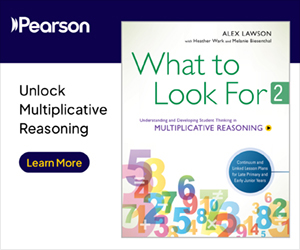Although modest in size, small and medium-sized enterprises (SMEs) have a massive impact on the Canadian economy. Their owners employ 90% of the Canadian private-sector workforce and make up most of the companies in Canada. But beyond business, these entrepreneurs are increasingly recognized as key actors in driving social, economic and environmental value for community well-being both in Canada and around the world.
Recognizing this potential, a global network of researchers led by the University of Waterloo committed to helping SMEs build their capacity thanks to a $2.5 million grant from the Social Science and Humanities Research Council. Spanning five countries and reaching as far as Australia, the funding enabled TRANSFORM to catalogue what SME leaders are doing to accelerate sustainability and, most excitingly, launch new projects.
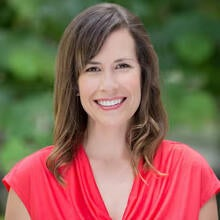
Dr. Sarah Burch, Canada Research Chair in Sustainability Governance and Innovation, Professor in the Faculty of Environment, Executive Director, Waterloo Climate Institute, Fellow, Balsillie School of International Affairs
"This is where the project became really interesting," says Dr. Sarah Burch, TRANSFORMS's lead project investigator. "We collaborated with SMEs and nonprofits for the last few years to help them design new sustainability experiments, implement them, evaluate them, see what's working and how we can help."
From thought to transformation
The ideation for these new projects started with capacity building events held in the U.S., Europe and Latin America. In Canada, researchers invited small business owners, municipal practitioners and civil society to a High-Level Sustainability Summit to consider how to accelerate sustainability-oriented practices in small firms.
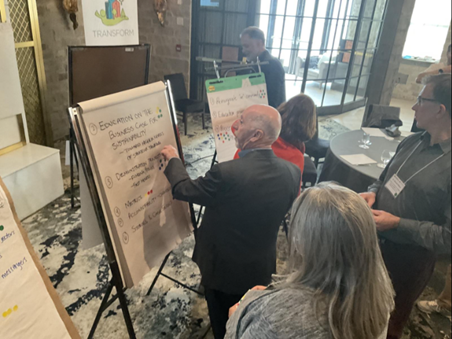
At the High Level Sustainability Summit entrepreneurs and civil society groups envisioned a supportive ecosystem for small businesses and prioritized actions.
From a suite of experiments, TRANSFORM supported SMEs with seed grants and assigned research assistants who worked alongside them to bring the projects to life.
One recipient, 100KM Foods, partnered with a vermiculture compositing business to help restaurants redirect their food waste. They explored the use of delivery vehicles to transport discarded food to the compositing site after produce drop-offs in an effort to reduce waste, enrich biodiversity and strengthen local food security all at once.
Abroad, TRANSFORM researcher Dr. Jose DiBella collaborated with the Data Hub and Water Institute at Tec de Monterrey in Mexico to develop a filtration system to recycle water from laundromats to help their community deal with seasonal drought and water scarcity.
"Laundromats are important cultural hubs in the community and users of critical water resources," DiBella says. "We also considered if there was a way to amplify the impact of a technical solution by working to reach the community through art, reflecting on values that can contribute to both water conservation and deepen community ties."
An art-based watercolour community event was designed by researchers to test public perceptions of using recycled water and familiarize residents with the potential of their local businesses to improve water management practices.
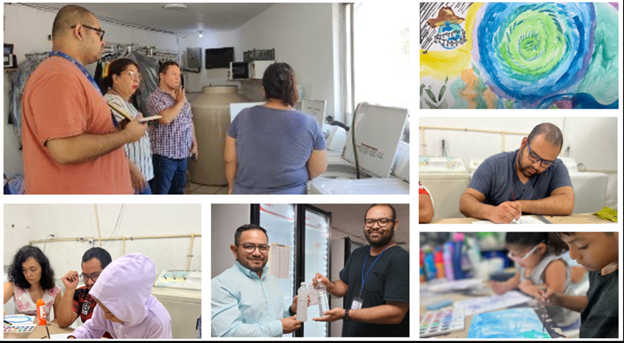
Monterrey, Mexico 2023. Demonstrating the water filtration system in the laundrette and hosting the watercolor workshop with recycled water.
Delivering tangible benefits
Burch asserts that as a society we largely know what to do about climate change, but we aren't acting fast enough or scaling solutions to a degree that can effectively push us towards a low-carbon future. That's why TRANSFORM's work was critical in moving the needle on scalability.
At its core TRANSFORM has been deeply transdisciplinary, cutting across sectors and disciplinary borders to work on sustainability issues with social and ecological benefit as intentional goals of the work. So those outcomes aren't happy accidents or something that someone else does.
"As researchers we're engaged in trying to deliver tangible benefits," she says. "We all came from different backgrounds and work and live in very different contexts, but we found a common thread among all these experimental activities, which was how important it is to try new and radical things with amplification in mind."
Partnerships like this one are a hallmark of the University of Waterloo, which champions collaborative research with industry and community partners. It's an approach that is propelling this type of boundary-breaking research and is just one of the many reasons Waterloo is a leader in sustainability research and education.
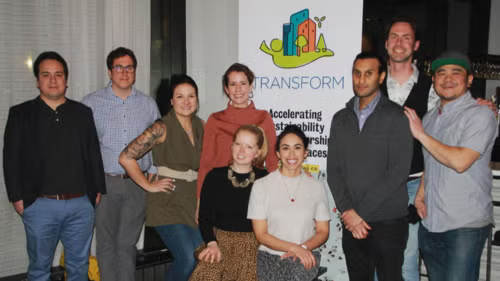
The TRANSFORM team in 2020 at their spring social.
A legacy in action
As TRANSFORM winds down, there's still a lot that the team wants to accomplish. At the top of the list is continuing to collaborate with policymakers so that the project's findings support lasting change. They will work with municipal, provincial and federal governments to explore how to better build capacity in the small business sector so that SMEs in Canada thrive and are resilient to climate change.
Findings will also be shared at a community symposium being held in September marking the research group's final chapter.
Scientists, small businesses and municipal governments involved with the project will gather to celebrate their accomplishments, exchange knowledge and solidify connections built through the project. To honour this work, the group will plant a micro-forest and create an art installation to recognize the past seven years. The group will also host a sold-out public lecture, Pathways to a Sustainable World, delivered by Diana Fox Carney.
"Ms. Fox Carney is an exceptional climate change and energy policy expert," Burch says. "She has decades of experience in the field and has done incredible international work. We invited her so that the broader community could hear one of the most important voices nationally."
Next spring, TRANSFORM will officially wrap up. A database of the project's findings and experiments will be available for others to draw inspiration from in years to come.
"Leading TRANSFORM has been an incredibly rewarding journey, and we've built lasting partnerships around the world. We're excited to move ahead with future work, exploring the ingredients of accelerated transitions toward low-carbon resilient communities."
Thank you to the co-investigators and broader TRANSFORM team: Arnim Wiek, Daniel Lang, Jose DiBella, Barry Ness, Megan Farrelly, Wendy Stubbs, Tova Davidson, Taginder Clair, Kayne Boyall, Kai Reimer-Watts, Christopher Orr, and many others.
Photos by: Luis Cortes, Taginder Clair and Sarah Burch.










